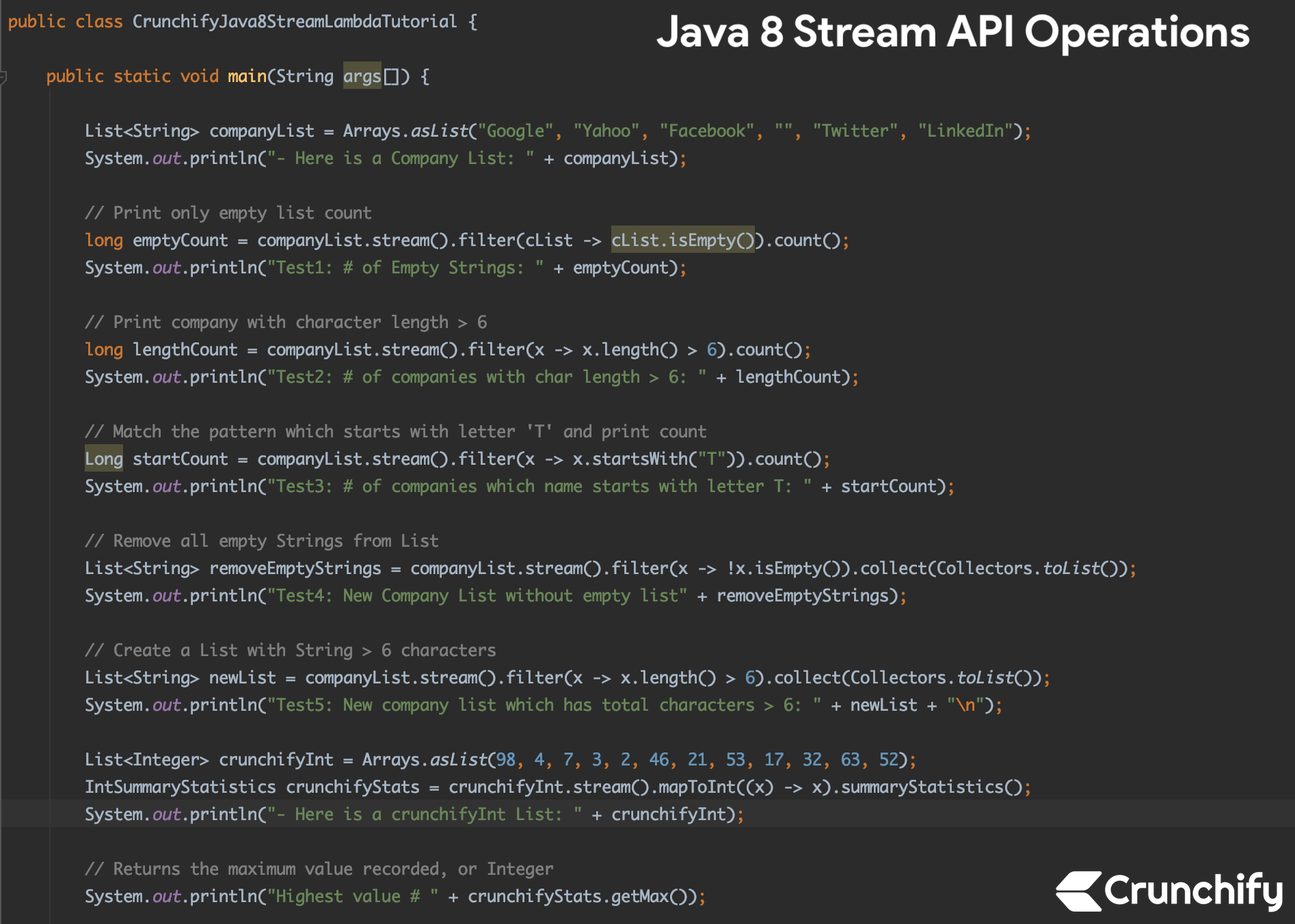
Java is a collection of APIs and with the introduction of Java 8, we do have more choice than before.
java.util.stream API supports functional-style operations on streams of elements, such as map-reduce transformations on collections. Most stream operations accept parameters that describe user-specified behavior, which are often lambda expressions. There are some standard Iterate Through Java List tips also available in addition to basic simple LinkedList implementation but in this tutorial we will just go over some of Java8 Stream API operations and Lambda Expression.
Let’s get started
- Create CrunchifyJava8StreamLambdaTutorial.java
- Create a List of String companyList
- On above list perform below options
- Print only empty list count
- Print companyList with char length > 6 only
- Match the pattern which starts with letter ‘T’ and print count
- Remove all empty Strings from List
- Create a list with String > 6 characters
- Perform basic Math operations
- Highest Prime
- Lowest Prime
- Sum
- Average
- Join new list and UPPERCASE it
- Create cubes for list

Start Using Java Lambda Expressions
package crunchify.com.tutorials;
import java.util.Arrays;
import java.util.IntSummaryStatistics;
import java.util.List;
import java.util.stream.Collectors;
/**
*
* @author https://Crunchify.com
*/
public class CrunchifyJava8StreamLambdaTutorial {
public static void main(String args[]) {
List<String> companyList = Arrays.asList("Google", "Yahoo", "Facebook", "", "Twitter", "LinkedIn");
System.out.println("- Here is a Company List: " + companyList);
// Print only empty list count
long emptyCount = companyList.stream().filter(cList -> cList.isEmpty()).count();
System.out.println("Test1: # of Empty Strings: " + emptyCount);
// Print company with character length > 6
long lengthCount = companyList.stream().filter(x -> x.length() > 6).count();
System.out.println("Test2: # of companies with char length > 6: " + lengthCount);
// Match the pattern which starts with letter 'T' and print count
Long startCount = companyList.stream().filter(x -> x.startsWith("T")).count();
System.out.println("Test3: # of companies which name starts with letter T: " + startCount);
// Remove all empty Strings from List
List<String> removeEmptyStrings = companyList.stream().filter(x -> !x.isEmpty()).collect(Collectors.toList());
System.out.println("Test4: New Company List without empty list" + removeEmptyStrings);
// Create a List with String > 6 characters
List<String> newList = companyList.stream().filter(x -> x.length() > 6).collect(Collectors.toList());
System.out.println("Test5: New company list which has total characters > 6: " + newList + "\n");
List<Integer> crunchifyInt = Arrays.asList(98, 4, 7, 3, 2, 46, 21, 53, 17, 32, 63, 52);
IntSummaryStatistics crunchifyStats = crunchifyInt.stream().mapToInt((x) -> x).summaryStatistics();
System.out.println("- Here is a crunchifyInt List: " + crunchifyInt);
// Returns the maximum value recorded, or Integer
System.out.println("Highest value # " + crunchifyStats.getMax());
// Returns the minimum value recorded, or Integer
System.out.println("Lowest value # " + crunchifyStats.getMin());
// Returns the sum of values recorded, or zero if no values have been recorded.
System.out.println("Sum of All: " + crunchifyStats.getSum());
// Returns the arithmetic mean of values recorded, or zero if no values have been recorded.
System.out.println("Average of all: " + crunchifyStats.getAverage() + "\n");
// Convert String to UPPERCASE and join them using space
List<String> crunchifyTips = Arrays.asList("this", "is", "crunchify", "java8", "tutorial");
// Performs a mutable reduction operation on the elements of this stream using a Collector.
String joinList = crunchifyTips.stream().map(x -> x.toUpperCase()).collect(Collectors.joining(" "));
System.out.println("- Join All String with UPPERCASE: " + joinList);
// Create List of Cubes
List<Integer> numbers = Arrays.asList(1, 2, 3, 4, 5);
List<Integer> cubes = numbers.stream().map(myInt -> myInt * myInt * myInt).distinct().collect(Collectors.toList());
System.out.println("- Create cubes for 1,2,3,4: " + cubes + "\n");
}
}
Result:
- Here is a Company List: [Google, Yahoo, Facebook, , Twitter, LinkedIn] Test1: # of Empty Strings: 1 Test2: # of companies with char length > 6: 3 Test3: # of companies which name starts with letter T: 1 Test4: New Company List without empty list[Google, Yahoo, Facebook, Twitter, LinkedIn] Test5: New company list which has total characters > 6: [Facebook, Twitter, LinkedIn] - Here is a crunchifyInt List: [98, 4, 7, 3, 2, 46, 21, 53, 17, 32, 63, 52] Highest value # 98 Lowest value # 2 Sum of All: 398 Average of all: 33.166666666666664 - Join All String with UPPERCASE: THIS IS CRUNCHIFY JAVA8 TUTORIAL - Create cubes for 1,2,3,4: [1, 8, 27, 64, 125] Process finished with exit code 0
These are very basic Stream and Lambda Expression introduced in Java8. In next tutorial we will go over real life enterprise level example on the same.
